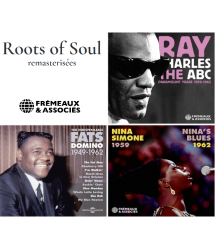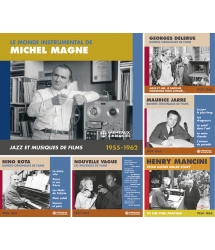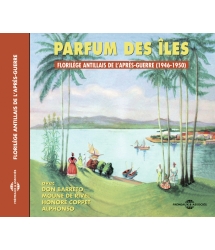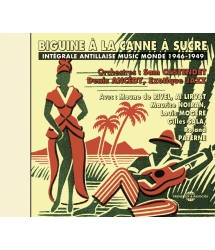These two wonderfully packaged sets are the post-war conterpoint to the three double CD sets reviewed in B&R 121. The « Canne à sucre » opened up very soon after the liberation of Paris in 1944 and quickly became the leading French Carribean nightclub in Paris, offering a safe haven to the biguine, the style from the French islands of Martinique and Guadaloupe, wich had almost died out and been superseded by jazz in the French public’s affections during the Second World War. The club finally closed in 1996. Drummer/singer/bandleader and sometimes clarinetist Sam Castendet was the man who really put the club on the map, and it is fitting that he is represented on FA051 by twelve titles, half a dozen each from 1946 and 1949 and including some quite pointed and sometimes starling lyrics set to music, frequently akin to trinidadian calypso of the early post-war era. ‘Lévé Yo Lévé Yo Ka’ is even more suprising perhaps, a percussion only accompanied song that sound certenly related to the African rooted ‘Gwo-ka’ from Guadaloupe. The beautiful Moune De Rivel recorded her six titles in Paris during a vacation from her two year long residency at the New York club Café Society (during which time she married jazz pianist Ellis Larkins). Her coquettish numbers all have a very marked Carribean lilt (check out her own album on Frémeaux FA 438, recorded in 2000 and wich contains a worthy remake of ‘Cé Con Ca Ou Ye’, the catchy original is one of the highlights of this album). L’Exotique Jazz never actually played at the Canne A Sucre, but the inclusion of this little band’s four titles from January 1948 is justified as the music fits so well with the rest and they complete the reissue on this set of all French Caribbean titles recorded for the Music Monde label. Moving on to ‘Parfum des Iles’, Cuban guitarist Don Barreto actually has the distinction of being the first to record biguines in Paris after the war (he had recorded similar material in the thirties) and his sides include Antillean clarinetists Edouard Pajaniandy and Sylvio Siobud, with Moune De Rivel handling the singing on two titles. Martinican clarinet maestro Honoré Coppet plays with piano and rhythm section on his eight titles, dating from 1950 and including three biguines, three rumbas, a créole waltz and a samba – after wich he went on to become one of the biggest West Indian music names in France over the following few years. ‘Parfum des Iles’ is really a showcase for the créole clarinet – but if that sounds rather dry and academic, this lively and spirited collection is anything but. On quite a few numbers too it sounds as through the music of the French Windward islands certainly influenced Trinidadian calypso musicians, so if your interests lie in that direction, both releases are highly recommended. Norman Darwen – BLUES & RHYTHM












